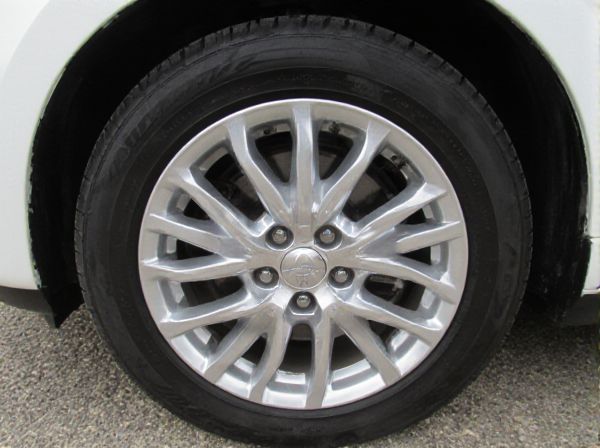
Photo illustration: Alloy vs Steel Wheel
Alloy wheels offer lighter weight and enhanced performance compared to traditional steel wheels, improving your vehicle's handling and fuel efficiency. Steel wheels are generally more durable and cost-effective, making them ideal for rough conditions and everyday driving. Choosing between alloy and steel wheels depends on your priorities for aesthetics, durability, and driving performance.
Table of Comparison
| Feature | Alloy Wheel | Steel Wheel |
|---|---|---|
| Material | Aluminum alloy | Steel |
| Weight | Lighter | Heavier |
| Durability | Less impact resistant | High impact resistance |
| Design | Stylish, variety of designs | Simple, basic design |
| Corrosion Resistance | Good corrosion resistance | Susceptible to rust |
| Cost | More expensive | Economical |
| Performance | Improves fuel efficiency and handling | Less impact on performance |
| Repair | Harder to repair | Easier to repair |
| Usage | Preferred for passenger cars and sports cars | Common in trucks, winter tires |
Introduction to Alloy and Steel Wheels
Alloy wheels are made from a blend of aluminum or magnesium metals, offering lighter weight and improved heat conduction compared to traditional steel wheels. Steel wheels, crafted from carbon steel, provide exceptional durability and cost-effectiveness but tend to be heavier and less responsive in performance. The choice between alloy and steel wheels depends on factors like vehicle type, driving conditions, and aesthetic preference.
Composition and Manufacturing Differences
Alloy wheels are primarily composed of aluminum or magnesium alloys, which offer lighter weight and improved heat dissipation compared to traditional steel wheels made from pressed high-strength steel. The manufacturing process for alloy wheels involves casting or forging, resulting in more precise shapes and designs, while steel wheels are typically stamped and welded, leading to simpler and heavier structures. These composition and manufacturing differences influence the overall performance, durability, and aesthetic appeal of the wheels on vehicles.
Weight Comparison: Alloy vs Steel Wheels
Alloy wheels are significantly lighter than steel wheels, typically weighing 20-30% less, which enhances vehicle performance and fuel efficiency. The reduced weight of alloy wheels improves acceleration, braking, and handling by lowering unsprung mass. Steel wheels, being heavier and more durable, are less effective for weight reduction but offer better resistance to damage in rough driving conditions.
Durability and Strength Factors
Alloy wheels, made from aluminum or magnesium alloys, offer lighter weight and better corrosion resistance but generally lack the same impact strength as steel wheels. Steel wheels excel in durability due to their robust construction, making them less prone to bending or cracking under heavy loads or rough terrain. While steel wheels provide superior toughness for harsh driving conditions, alloy wheels balance strength with enhanced performance and resistance to environmental damage.
Performance and Handling
Alloy wheels offer superior performance and handling due to their lighter weight, which reduces unsprung mass and improves acceleration, braking, and cornering response. Steel wheels, being heavier, typically result in slower handling and reduced fuel efficiency but provide greater durability for rough conditions. Enhanced heat dissipation in alloy wheels also prevents brake overheating, contributing to more consistent performance during spirited driving or track use.
Aesthetic Appeal and Design Options
Alloy wheels offer a sleek, modern aesthetic with intricate design options, making them popular for enhancing vehicle appearance and customization. Steel wheels typically have a utilitarian look with limited design variations, prioritizing durability over style. The lightweight nature of alloy wheels allows for sharper, more dynamic shapes that steel wheels generally cannot achieve.
Cost Analysis: Alloy vs Steel Wheels
Steel wheels typically cost 30-50% less than alloy wheels, making them a budget-friendly option for vehicle owners. Alloy wheels, while more expensive upfront, offer better fuel efficiency and improved performance, which can lead to long-term savings. Maintenance and repair costs for steel wheels are generally lower due to their durability and ease of fixing dents compared to the higher reconditioning costs of alloy wheels.
Maintenance and Repair Considerations
Alloy wheels require more careful maintenance due to their susceptibility to corrosion and damage from harsh chemicals, necessitating regular cleaning with mild detergents and protective coatings to preserve their finish. Steel wheels are easier to maintain and repair, as they are more resistant to dents and scratches and can be quickly fixed with simple tools or replaced at a lower cost. Choosing between alloy and steel wheels involves evaluating the frequency of maintenance efforts and potential repair expenses based on driving conditions and usage.
Suitability for Various Driving Conditions
Alloy wheels offer superior heat dissipation and reduced weight, enhancing performance and fuel efficiency in high-speed or sporty driving conditions. Steel wheels provide exceptional durability and resistance to impact, making them ideal for harsh road surfaces and off-road driving. For snowy or icy conditions, steel wheels are often preferred due to their toughness and ease of repair, while alloy wheels perform better on dry, smooth roads with improved handling.
Conclusion: Choosing the Right Wheel Type
Alloy wheels offer superior performance benefits such as lighter weight and enhanced heat dissipation, making them ideal for sports and luxury vehicles. Steel wheels provide durability and cost-effectiveness, better suited for heavy-duty use and harsh driving conditions. Selecting the right wheel type depends on balancing factors like vehicle type, driving environment, budget, and desired aesthetics.
 caratoz.com
caratoz.com